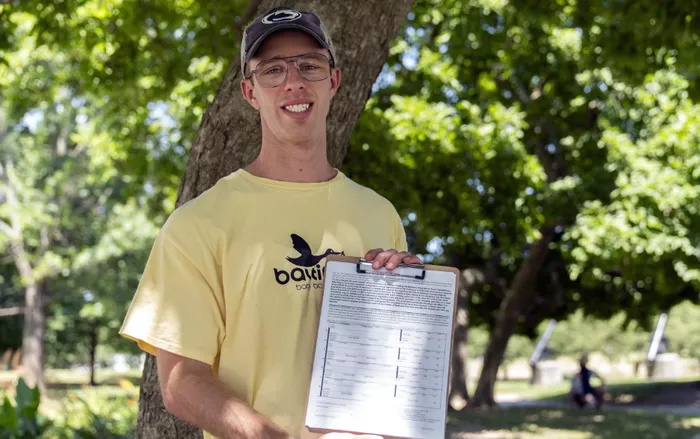BALTIMORE — New parents in Baltimore might soon get a $1,000 “baby bonus” if voters approve a proposal designed to reduce child poverty with a one-time cash payment.
A group of Baltimore teachers is leading this effort. They recently gathered the 10,000 signatures needed to put the initiative on the November ballot. The campaign used extensive canvassing and a cute logo featuring a flying cartoon stork carrying a bag of money.
The proposal is inspired by a similar program in Flint, Michigan, where women receive $1,500 during mid-pregnancy and $500 per month for the first year after giving birth. Officials said it was the first program of its kind in the U.S.
While countries in Europe and Asia have larger cash payments to encourage higher birth rates, these programs do not specifically address child poverty. For example, Italy offers baby bonus checks to increase its population due to low birth rates.
Baltimore campaign organizers believe national changes are necessary to lift families out of poverty. They see the $1,000 bonus as a significant first step.
“If we’re going to spend a limited amount of money, where do you get the most bang for your buck? Research says at birth,” said Nate Golden, a high school math teacher and co-founder of the Maryland Child Alliance, which is pushing for the ballot initiative. “This could literally have a lifelong impact on a kid.”
Golden hopes the program will show elected leaders in Baltimore and beyond that voters want policies to help vulnerable children succeed.
This issue is urgent in Baltimore, where an estimated 31% of school-aged children live in poverty, according to census data. Nationally, child poverty rates fell during the pandemic due to federal relief programs but climbed back to about 12% in 2022.
Research shows it’s extremely difficult for poor individuals to move up the economic ladder, especially among communities of color. Most American children born into the lowest income bracket remain at the same socioeconomic level throughout their lives.
Golden witnesses these struggles in his classroom each year, with students facing homelessness, food insecurity, gun violence, and other challenges.
“When you see what they’re going through outside school, I’m still going to demand their best in the classroom, but it’s just not enough,” he said. “We have to take care of these underlying needs before we can get kids to focus on learning.”
If approved, the initiative would provide all new parents in Baltimore with a one-time payment of at least $1,000. With about 7,000 children born in Baltimore each year, the program would cost around $7 million annually, which is approximately 0.16% of the city’s annual operating budget. Supporters emphasize that it won’t result in higher taxes, but it will be up to the Baltimore City Council to allocate funds if it passes.
Advocates argue that distributing the funds universally ensures no one is left out, even though some money will go to affluent parents who don’t need assistance. Golden believes this is necessary to avoid excluding the poorest families.
Given the relatively small payments, the universal approach is practical because developing a qualification system could add significant costs and delay the program, said Christina DePasquale, associate professor of economics at Johns Hopkins Carey Business School.
Above all, DePasquale said, the initiative will raise awareness about childhood poverty and could lead to more comprehensive changes.
“It’s worthwhile in the sense that it gets people thinking about it,” she said. “It’s something to build off of. Even if you don’t have something perfect, the less perfect version of it is better than not having it at all.”
While $1,000 isn’t a life-changing amount, it could help cover some costs associated with having a baby, like diapers, formula, strollers, and cribs. For parents on the margins, this could make a real difference, said Nadya Dutchin, executive director of ShareBaby, a Baltimore-based organization that distributes free diapers and other baby essentials.
“I don’t think people really pay enough attention to the material insecurities that contribute to parental stress,” she said. “If you don’t have enough money to purchase diapers to keep your child dry, safe and healthy, you’re going to be stressed and your baby is going to be stressed.”
Dutchin noted that requests for supplies increased significantly last year due to rising inflation and stagnant wages.
The largest federal program addressing childhood poverty is the child tax credit, which was temporarily expanded during the pandemic. Though effective, it leaves out some families due to paperwork and qualification requirements.
In Maryland, Gov. Wes Moore campaigned on a promise to help the state’s youngest and most vulnerable residents. Before becoming Maryland’s first Black governor, he led one of the nation’s largest poverty-fighting organizations. This year, he signed legislation providing grant funding for community organizations in high child poverty areas.
Baltimore also launched a two-year pilot program in 2022, providing $1,000 monthly payments to a select group of young parents using federal COVID-relief money. A recent report on the ongoing pilot found that participants experienced more housing stability and improved mental health during the first year.


